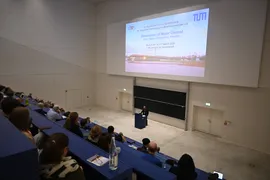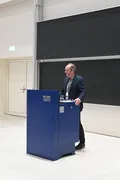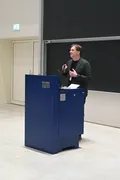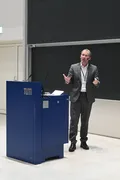Under the title "Dimensions of Motor Control – Sport, Health, Development, Robotics" the 18th Conference of the Motor Control Section of the German Association for Sport Science (DVS) took place from March 19 to 21, 2025, at the TUM Campus in Olympiapark (CiO). Organized by the Chair of Human Movement Science and the Professorship of Neuromuscular Diagnostics, the event provided a high-level platform for scientific exchange. In addition to presenting current research findings, innovative approaches to motor research were discussed from various perspectives.
On Wednesday afternoon, Prof. Dr. Joachim Hermsdörfer, Department Head and Full Professor of Human Movement Science, opened the three-day conference in front of approximately 220 participants, including 59 international researchers from 18 different countries. In his speech, he not only introduced the department and the unique features of the new TUM CiO to the guests—who represented a total of 75 institutions—but also outlined the thematic focus of the conference: “As you all are aware of, motor control has many dimensions. We have sports, of course, as our central theme, and in recent years we have also talked about health and development. And what is new now is that on this conference we will also speak about robotics.”
The program featured inspiring keynote lectures on sport, health, development, and robotics by renowned experts, offering fresh perspectives for research and practice. Additionally, numerous symposia, a poster session with 34 presenters, as well as workshops and panel discussions provided diverse opportunities to delve deeper into specific topics, ranging from athletic performance to robot-assisted rehabilitation.
Prof. Hermsdörfer emphasized that the successful execution of the conference was largely due to the scientific staff members: “I would like to start already at the opening with thanking the “true” organizers, Dr. Waltraud Stadler and Dr. Philipp Gulde, who have done all the work that takes months before this day. And, of course, we have teams from both of our Chairs who are taking care of all the organizational things that are important for the conference during these three days.”
Co-organizer Prof. Dr. David Franklin, Head of the Professorship of Neuromuscular Diagnostics, then highlighted the integration of robotics into the conference’s content: “Obviously, I don’t need to say much about how important health and sport are to motor control and vice versa, and I think we all know how important development is to understanding motor control and how that guides us. However, my interest is in how we can integrate robotics and motor control together. It is more than simply using robotics to measure motor control, because robotics are also a wonderful tool for testing motor control theories through implementing control strategies on humanoid robotics, robotic arms or prostheses. And, a little bit away from the sports focus, a very interesting point is how humans and robots work together and how we can use this to even study how humans interact and collaborate.”
As President of the German Association for Sport Science and Head of the Professorship of Biomechanics in Sport, Prof. Dr. Ansgar Schwirtz participated both as an internal and external attendee. “It is about engaging in discussions on the subject of sport science within the Motor Control Section. The interdisciplinary connection is reflected in the various themes of this conference, which represent a broad spectrum of sport science. It is clear that sport science has something to say.” He encouraged attendees to reflect over the coming days on whether the term motor control still adequately encompasses the diverse perspectives presented.
In a panel discussion, important questions about the concept of sports motor control, the content of sport teacher education and the scientific fields involved were raised and discussed by the experts. Application-orientated basic research in the various disciplines is seen as a central field of interest in this context.
On the third day, Prof Hermsdörfer concluded the conference with a very positive summary: “I was extremely positively surprised by the great interest in our conference, which was reflected in the large number of participants, but also in their active participation in all the different sessions that were offered.”
To the Homepage of the Chair of Human Movement Science
To the Homepage of the Professorship of Neuromuscular Diagnostics
Contact:
Prof. Dr. Joachim Hermsdörfer
Department Head Health and Sport Sciences
Chair of Human Movement Science
Georg-Brauchle Ring 60/62
80992 Munich
Tel.: +49 89 289 24550
E-Mail: joachim.hermsdoerfer(at)tum.de
Prof. Dr. David Franklin
Department Head Health and Sport Sciences
Neuromuscular Diagnostics
Georg-Brauchle Ring 60/62
80992 Munich
Tel.: +49 89 289 24583
E-Mail: david.franklin(at)tum.de
Text & Photos: Jasmin Schol



